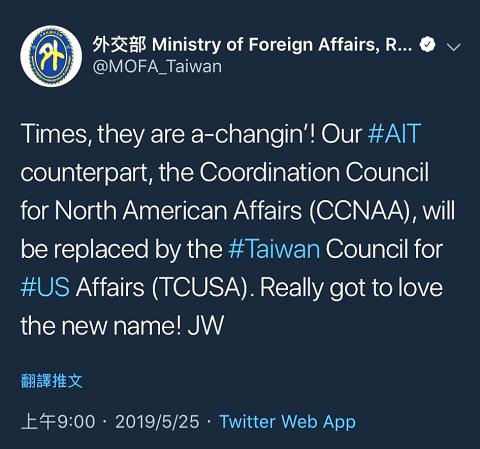The Coordination Council for North American Affairs has been renamed the Taiwan Council for US Affairs, President Tsai Ing-wen (蔡英文) said yesterday, hailing the move as a breakthrough in Taiwan-US relations.
The names of Taiwan and the US appear alongside each other in an agency’s title for the first time, symbolizing the affinity and reciprocal trust between the two nations, Tsai wrote on Facebook.
Based on the US’ Taiwan Relations Act, Washington in 1979 established the American Institute in Taiwan (AIT) to deal with affairs related to Taiwan, and Taiwan established the coordination council as a reciprocal agency, she wrote.

Screen grab from Twitter
Taiwan used the phrase “North American” instead of the US due to special historical conditions at the time, showing the difficult situation Taiwan faced in international relations, she said.
Despite past obstacles, the two sides agreed to rename the council after long-running negotiations to coincide with the 40th anniversary of the TRA, Tsai said, thanking Ministry of Foreign Affairs personnel for the achievement.
With Taiwan and the US becoming closer over the past few years, the two would work more closely on regional peace and Indo-Pacific security, the ministry said in a news release.
National Security Council Secretary-General David Lee (李大維) visited US academics and officials from May 13 to Tuesday to discuss security challenges that Taiwan and the US face together, it added.
Lee met with officials from the US National Security Council and other government agencies, as well as Asian policy experts from think tanks, including the Center for Strategic and International Studies, Brookings Institution and Georgetown University, it said.
Lee also met with government officials from Taiwan’s diplomatic allies, who reaffirmed their support for maintaining a free and open Indo-Pacific region, the ministry said.
“Times, they are a-changin’,” Minister of Foreign Affairs Joseph Wu (吳釗燮) wrote in English on the ministry’s official Twitter account yesterday. “Really got to love the new name!”
The move follows a similar name change in May 2017, when the Association of East Asian Relations was renamed the Taiwan-Japan Relations Association.
Lin Wen-cheng (林文程), a professor at National Sun Yat-sen University’s Institute of China and Asia-Pacific Studies, said the renaming signals that Taiwan and the US are moving toward establishing semi-official ties.
The previous title was unilaterally decided by the US when it switched recognition to Beijing in a bid to downplay its links to Taiwan, he said, adding that nonetheless, the renaming is a positive sign showing the US’ increasing support for Taiwan and the positive development of bilateral ties.
Meetings between Taiwanese and US national security officials were often kept confidential in the past, while the ministry’s revelation of the meetings demonstrates that bilateral relations have been improving, said Alexander Huang (黃介正), an associate professor at Tamkang University’s Graduate Institute of International Affairs and Strategic Studies and a former Mainland Affairs Council deputy minister.
Additional reporting by Peng Wan-hsin

The CIA has a message for Chinese government officials worried about their place in Chinese President Xi Jinping’s (習近平) government: Come work with us. The agency released two Mandarin-language videos on social media on Thursday inviting disgruntled officials to contact the CIA. The recruitment videos posted on YouTube and X racked up more than 5 million views combined in their first day. The outreach comes as CIA Director John Ratcliffe has vowed to boost the agency’s use of intelligence from human sources and its focus on China, which has recently targeted US officials with its own espionage operations. The videos are “aimed at

STEADFAST FRIEND: The bills encourage increased Taiwan-US engagement and address China’s distortion of UN Resolution 2758 to isolate Taiwan internationally The Presidential Office yesterday thanked the US House of Representatives for unanimously passing two Taiwan-related bills highlighting its solid support for Taiwan’s democracy and global participation, and for deepening bilateral relations. One of the bills, the Taiwan Assurance Implementation Act, requires the US Department of State to periodically review its guidelines for engagement with Taiwan, and report to the US Congress on the guidelines and plans to lift self-imposed limitations on US-Taiwan engagement. The other bill is the Taiwan International Solidarity Act, which clarifies that UN Resolution 2758 does not address the issue of the representation of Taiwan or its people in

US Indo-Pacific Commander Admiral Samuel Paparo on Friday expressed concern over the rate at which China is diversifying its military exercises, the Financial Times (FT) reported on Saturday. “The rates of change on the depth and breadth of their exercises is the one non-linear effect that I’ve seen in the last year that wakes me up at night or keeps me up at night,” Paparo was quoted by FT as saying while attending the annual Sedona Forum at the McCain Institute in Arizona. Paparo also expressed concern over the speed with which China was expanding its military. While the US

SHIFT: Taiwan’s better-than-expected first-quarter GDP and signs of weakness in the US have driven global capital back to emerging markets, the central bank head said The central bank yesterday blamed market speculation for the steep rise in the local currency, and urged exporters and financial institutions to stay calm and stop panic sell-offs to avoid hurting their own profitability. The nation’s top monetary policymaker said that it would step in, if necessary, to maintain order and stability in the foreign exchange market. The remarks came as the NT dollar yesterday closed up NT$0.919 to NT$30.145 against the US dollar in Taipei trading, after rising as high as NT$29.59 in intraday trading. The local currency has surged 5.85 percent against the greenback over the past two sessions, central